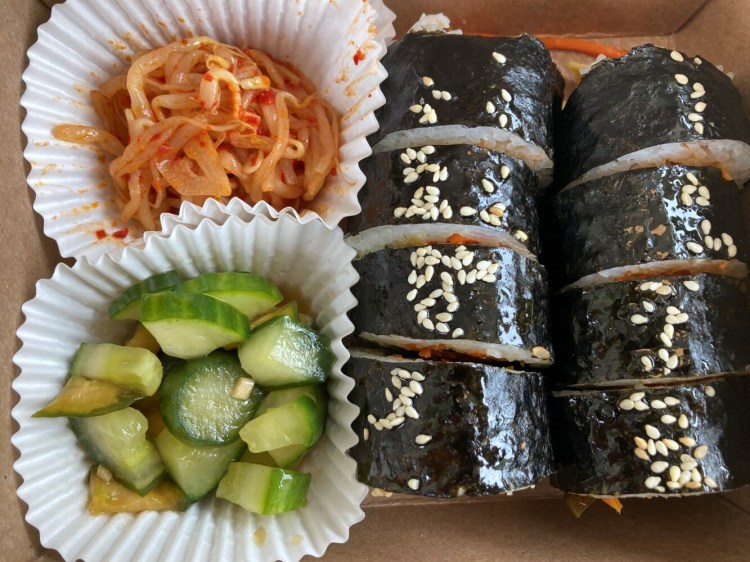Even though I have begun to make yogurt and bake sourdough bread, and yes, there are jars of kimchi and Morse’s sauerkraut in my refrigerator at this very moment, I do not consider myself a fermenter, if there is such a word. Added proof: Several gorgeous, highly regarded and comprehensive fermentation books have been published in the last decade, but they are not on my shelves. I feel far too old and square for anything as Brooklyn-esque and hip as a fermentation hobby.
Yet when I found myself at the newly expanded Onggi Ferments & Foods on Washington Avenue in Portland on a recent Friday afternoon, I was as beguiled as the steady stream of other customers.
“Oh my God, Emily, look at all these things!” said one, as she browsed the shelves of beautifully packaged fermented (and other) goods. “Look at this ume jam!” another customer enthused some 20 minutes later. “I tried the mochi matcha,” a third told her friend as the pair wandered the small, highly curated store. “Unbelievable!”
Onggi, which started life in the nearby repurposed shipping containers, also on Washington Avenue, moved to its new location in April. Now, in addition to items for small-batch sale like that jam, as well as – to name just a few – chili crisp, local cider vinegar, black garlic, pickles, local miso, black sesame seed butter, fish sauce, natto, Polish cabbage shredders and Korean onggi (the ceramic fermenting pots from which the store takes its name), it also serves a small changing menu of Korean-inflected lunch items, house-made fermented drinks, teas and coffees, and an array of unusual and imaginative East-West pastries.
You can order lunch for takeout, and much of the food is well-suited for that, or you can sit at the counter or one of two tables tucked into window nooks at the front of the store. It’s a sunny, pleasant spot for lunch. As you wait for your order, you’ve time to browse those tempting shelves and try to winnow down which jars and bottles to bring home.
I had the same struggle with the menu. It’s small. Even so, it’s so interesting and personal – not a greatest hits list of trendy menu items (fried Brussels sprouts, I’m looking at you) – I wanted everything on it. I finally settled on an egg omelette gimbap ($12), the “vivaciously vegetarian” choice (eggs, jalapeno, carrots, spinach), according to the menu. Gimbap, I learned, is the name for Korean-style rice rolls. They look very much like the Japanese version, but don’t taste like it, at least not like traditional Japanese sushi. Where classic Japanese rice rolls are subtle and delicate, my gimbap was bold, vibrant, spicy – and delicious.

Onggi Ferments & Foods on Washington Avenue. It is neighbor to Root Wild Kombucha. Photo by Peggy Grodinsky
The roll came cut into eight, sesame-seed sprinkled pieces, with a choice of two sides. Think bento box-sized sides, not Southern-style meat-and-three-sized sides. The garlicky soy sauce-cucumber salad and bean sprouts were both fresh, bright and crunchy; the mung beans stained my fork red with gochugaru (Korean chili flakes). Often after lunch, I want a nap. But my lunch at Onggi was a zippy, wake-me-up meal.
That was less true for the items I brought home, though I’m not complaining: a pork-kimchi pop-tart of sorts ($4.75), and that matcha-black sesame butter mochi ($3.50). Sadly, I lacked stomach space for the miso-scallion scone with chili crisp butter ($4). Another time. The mochi, which is gluten-free, was not remotely classic, but more like a blondie reimagined with rice flour and matcha. It was chewy, not too sweet and pleasantly dense.
Would you go back? That’s the most basic test for what makes a good restaurant. In this case, in a heartbeat.
Copy the Story LinkSend questions/comments to the editors.




Success. Please wait for the page to reload. If the page does not reload within 5 seconds, please refresh the page.
Enter your email and password to access comments.
Hi, to comment on stories you must . This profile is in addition to your subscription and website login.
Already have a commenting profile? .
Invalid username/password.
Please check your email to confirm and complete your registration.
Only subscribers are eligible to post comments. Please subscribe or login first for digital access. Here’s why.
Use the form below to reset your password. When you've submitted your account email, we will send an email with a reset code.